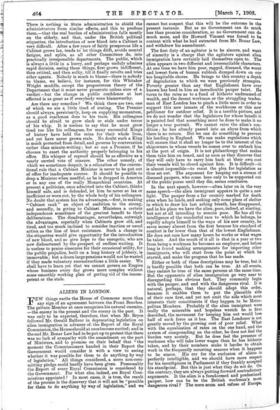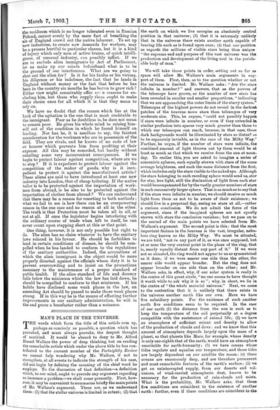ALIENS IN LONDON.
FEW things excite the House of Commons more than ..12 any sign of an agreement between the Front Benches. The private Member at once recognises his natural enemies, —the enemy in the present and the enemy in the past. It was only to be expected, therefore, that when Mr. Bryce followed Mr. Gerald Balfour in deprecating legislation on alien immigration in advance of. the Report of the Royal Commission, the Houseshould at once become excited; and in the end Mr. Bonar Law had to be put up to protest that there was no lack of sympathy with the amendment on the part of Ministers, and to promise on their behalf that "the moment the Commissioners handed in their Report the Government would consider it with a view to seeing whether it NM possible for them to do anything by way of legislation." All things considered, a more non-com- mitting pledge could hardly have been given. Presumably the Report of every Royal Commission is considered by the Government. For what else, indeed, are Royal Com- missions appointed.? In most cases, it is true, the result of the process is the discovery that it will not be "possible for them to do anything by way of legislation," and we cannot but suspect that this will be the outcome in the present instance. But as no Government can do much less than promise consideration, so no Government can do much more, and Sir Howard Vincent was forced to be content with what he had extracted from Mr. Bonar Law, and withdraw his amendment.
The first duty of an agitator is to be sincere, and want of sincerity is a charge that the agitators against alien immigration have certainly laid themselves open to. The alien appears in two different and irreconcilable characters. At one time we have him poor, ragged, diseased, the worst and lowest form of human rubbish dumped down on our too hospitable shores. He brings to this country a depth of degradation to which we were previously strangers. Poverty greater than any that Englishmen have ever known has bred in him an ineradicable pauper taint, Re turns to the rates as to a fund of hitherto undreamed-of wealth, and the decent workman or the struggling trades- man of East London has to pinch a little more in order to support this new inmate of the workhouse or this new petitioner for outdoor relief. It is a terrible picture, and we do not wonder that the legislators for whose benefit it is painted feel that something must be done to make it no longer a true portrait. We cannot raise the alien's con- dition; he has already passed into an abyss from which there is no return. But we can do something to prevent his landing in England. We can make regulations which will ensure that it shall no longer be to the interest of the shipowners in whose vessels he comes over to embark him at the port of origin. It is not philanthropy that makes them take him on board, and as soon as they discover that they will only have to carry him back at their own cost their vessels will be closed against him. It is difficult—it is almost impossible—to resist the plea for legislation as thus set out. The argument for keeping out a stream of diseased paupers, who come here only to be supported out of the public purse until they die, seems conclusive.
In the next speech, however—often later on in the very same speech—the alien immigrant appears in quite a new light. The pauper from a far country marked for death even when he lands, and seeking only some place of shelter in which to draw his last aching breath, has disappeared, and in his place we have the alien, poor, indeed, at starting, but not at all intending to remain poor. He has all the intelligence of the wonderful race to which he belongs, he rapidly adapts himself to the ways of his new country, be saves money almost from the first because his standard of comfort is far lower than that of the lowest Englishman. He does not care how many hours he works or what wages he takes. And the result of it all is that in a year or two from being a workman he becomes an employer, and before long is found making arrangements for importing other immigrants, who will start from the point at which he started, and make the progress that he has made.
Either or both of these descriptions may be true, but it is hardly possible that both can be true. At all events, they cannot be true of the same persons at the same time. But the opponents of alien immigration go very near to disregarding this obvious fact They commonly begin with the pauper, and end with the dangerous rival. It is natural, perhaps, that they should adopt this order, because it enables them to put the plausible side of their case first, and yet not omit the side which most interests their constituents if they happen .to be Metro- politan Members. Probably if the alien immigrant were really the miserable and hopeless wretch he is first described, the movement for keeping him out would lose half of such force as it has. The East Londoner is not greatly moved by the growing cost of poor relief. What with the equalisation of rates on the one hand, and the system of compounding on the other, he does not feel the burden very acutely. But he does feel the presence of workmen who will take lower wages than he has hitherto taken, and by their numbers make it harder to obtain work in the frequently recurring seasons when it happens to be scarce. His cry for the exclusion of aliens is perfectly intelligible, and we should have more respect for his mouthpieces in Parliament if they frankly accepted his standpoint. But this is just what they do not do. On the contrary, they are always putting forward contradictory arguments. It the alien is a foredoomed and predestined pauper, bow can he be the British workman's most dangerous rival ? The mere scum and refuse of Europe, the residuum which is no longer tolerated even in Russian Poland, cannot surely by the mere fact of breathing the air of England crowd out the native labourer. To set up new industries, to create new demands for workers, may be a process hurtful to particular classes, but it is a kind of injury which only men of active brains, of quick intelli- gence, of unusual industry, can possibly inflict. If we are to exclude alien immigrants by Act of Parliament, let us make up our minds beforehand what is to be the ground of our interference. What are we going to shut out the alien for? Is it for his faults or his virtues, his diligence or his indolence, the fact that he lands in England without, money or the fact that before he has been in the country six months he has begun to grow rich ? Either view might conceivably offer soi e reasons for ex- cluding him, but those who supply them ought to make their choice once for all which it is that they mean to rely on.
We have no doubt that the reason which lies at the back of the agitation is the one that is most creditable to the immigrant. Poor as he doubtless is, he does not mean to remain poor. He gives his whole mind to raising him- self out of the condition in which he found himself on landing. Nor has he, it is needless to say, the faintest consideration for the workmen who are in possession of the field. They are rivals, and he knows of no code of law or honour which prevents him from profiting at their expense. All this may be conceded, but hardly without entailing some very inconvenient consequences. If we begin to protect labour against competition, where are we to stop ? If it is expedient to protect labour against the competition of the maker of goods, why is it inex- pedient to protect it against the manufactured article ? These aliens are said to have introduced at least one new industry into London, that of cheap tailoring. If the native tailor is to be protected against the importation of work- men from abroad, is he also to be protected against the importation of clothes from abroad ? We can understand that there may be a reason for resorting to both methods ; what we fail to see is how there can be an overpowering reason in the one case and no reason at all in the other. The truth is that Protection must be taken all in all, or not at all. If once the legislator begins interfering with the ordinary course of trade when left to itself, he can never count upon stopping short at this or that point.
One thing, however, it is not only possible but right to do. The alien has no claim whatever to have the sanitary laws relaxed in his favour. He should be forbidden to land in certain conditions of disease, he should be com- pelled when he has landed to conform to the regulations of the sanitary authorities. Indeed, the accusations of which the alien immigrant is the object would be more properly directed, against the officials whose duty it is to prevent overcrowding and to insist on the precautions necessary to the maintenance of a proper standard of public health. If the alien standard of life and decency falls below the minimum which the law has laid down, he should be compelled to conform to that minimum. If his habits have disclosed some weak places in the law, an amending Act should be passed to make those weak places strong. If in this way he is the means of effecting further improvements in our sanitary administration, he will in the end prove a benefactor rather than a, nuisance.











































 Previous page
Previous page